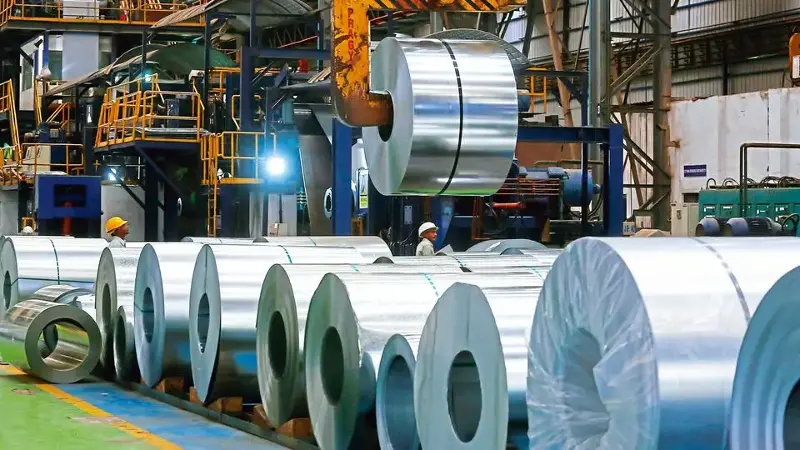
New Delhi: Environmental think-tank iFOREST on Thursday released India’s first ESG (environmental, social, and governance) report for the steel industry, introducing a common system to track and report carbon emissions and enhance sustainability disclosures.
The report also includes a steel-specific supplement to the Securities and Exchange Board of India's (Sebi) Business Responsibility and Sustainability Reporting (BRSR), which is designed to improve disclosure quality and attract climate finance.
The report comes at a time when decarbonization of steel sector has gained attention globally due to high carbon intensity of the industry and trade barriers being erected by various western economies, including the European Union that is implementing Carbon Border Adjustment Mechanism (CBAM), a carbon tariff on carbon-intensive products such as steel.
India has already started taking steps to reduce carbon intensity of its steel sector by devising green steel taxonomy. Implementation of globally acceptable Greenhouse Gas (GHG) accounting and MRV (monitoring, reporting & verification) framework would be the next step towards making Indian steel industry more green compliant.
“India needs trillions of dollars in climate finance to meet its mitigation and adaptation targets. To attract this level of finance, three elements are necessary. The first is a taxonomy that clearly defines climate finance, ensuring inclusion and exclusion are transparent. The second is a clear policy roadmap to decarbonize sectors to build investor confidence. The third is credible, comparable, and verifiable information to guide investment decisions," Chandra Bhushan, chief executive officer of iFOREST, said at the launch of the report.
"Our work today focuses on the last pillar—transparent ESG reporting for the steel sector. This will strengthen credible GHG emissions disclosure and enhance ESG reporting quality to attract climate finance into the sector,” he added.
The iron and steel industry, one of India’s most resource- and energy-intensive sectors, contributes around 12% of national carbon dioxide (CO₂) emissions. With steel output projected to rise from 140 million tonnes in 2023 to 255 million tonnes by 2030, and further to 500 million tonnes by 2050, the sector’s decarbonization is critical to India’s net-zero goals set for 2070.
At the India Green Steel Transition event in New Delhi, hosted in partnership with the industry body Indian Steel Association, iFOREST launched three key reports: BRSR Disclosure: ESG Performance of the Steel Sector (2023–24); BRSR Supplement for the Steel Sector: Enhancing ESG Disclosure and Transparency; and Unified GHG Accounting and MRV Framework for the Iron and Steel Sector.
Bhushan said that reporting standards developed by the think-tank could be used both by Indian steel industry and the ministry of steel to standardize green processes in steel sector that are also globally benchmarked.
iFOREST's BRSR analysis covered 31 reporting companies, representing 65% of India’s crude steel output and 60% of sector revenue. The study found that the sector emitted 221 million tonnes of carbon dioxide equivalent (CO₂e) in FY24, with an emission intensity of 2.54 tCO₂e per tonne of steel, higher than the global average of 1.92 tCO₂e/t. Renewable energy accounts for less than 0.5% of total energy use in the sector, while nearly half of water withdrawals occur in water-stressed regions.
The report highlights persistent social and governance gaps, with women forming 18% of board members and 7% of key managerial roles in the steel sector, and 56% of the workforce employed on contracts. Only 16 companies have formal anti-corruption frameworks.
“The way forward is to develop sector-specific BRSR reporting guidelines to provide credible information to investors. Sectoral GHG emission targets, supported by robust MRV systems, are essential to meet net zero goals. Along with disclosure, we also need a well-defined taxonomy to drive investments,” said Ajay Tyagi, former Sebi chairman.
Alok Sahay, secretary general, Indian Steel Association, said, “Steel in India is not just an industry; it serves a social purpose. The Indian steel industry will require an investment of ₹9 lakh crore to fund its greening initiatives. The unified GHG accounting and MRV framework, along with the ESG supplement released by iFOREST today, will play an important role in the disclosure of comparable and verifiable information.”
To address inconsistencies in emissions reporting, iFOREST unveiled a unified India-specific GHG accounting tool that simplifies and standardizes emissions tracking.
“Sector-specific templates are vital to strengthen ESG reporting in resource-intensive industries like steel. The BRSR Supplement provides a pathway for consistency, comparability, and credibility,” said Sanjeev Kanchan, director, industrial decarbonization & ESG, iFOREST.
